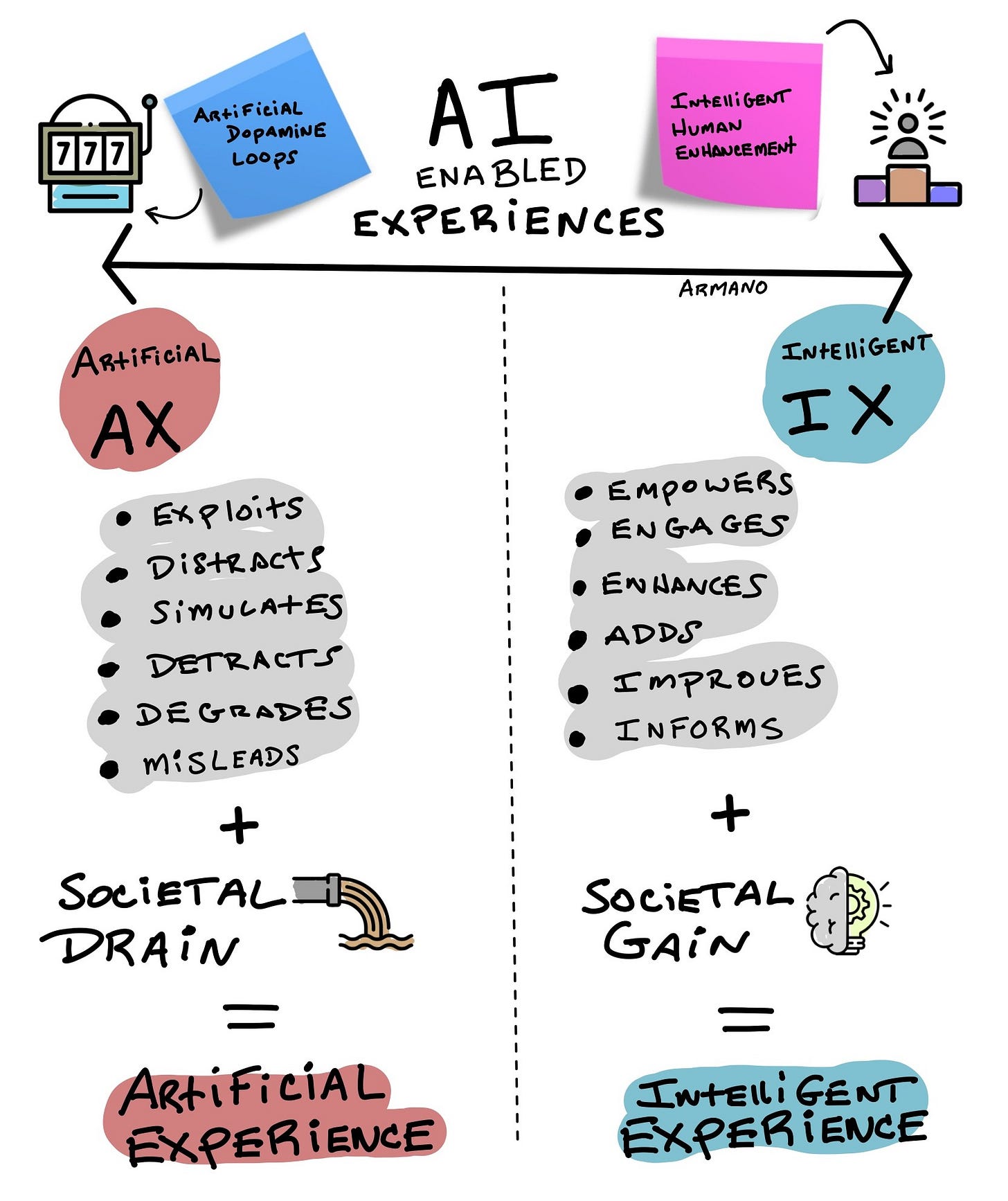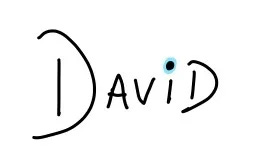I’ve been talking about “Intelligent Experiences” for a while now, and I like to think of it as simple shorthand to describe how our digital product experiences enhanced by AI, fundamentally change our relationship with technology. A quick recap on what I mean by Intelligent Experiences or “IX”:
Intelligent Experiences by Design
If you work closely (and long enough) with technology, you’ll see history repeat. You’ll say, “But David, AI is different”!
Intelligent Experiences are:
- Intelligent: Simulates or achieves the ability to “think.”
- Intuitive: Interacts with human counterparts in a natural, emotionally aware manner.
- Anticipatory: Learns from and can anticipate human collaborators' needs and emotional state.
- Autonomous: Takes actions, performs tasks, and makes decisions independently.
I recently came across the story of a high school student who leveraged AI to rethink the nutrition tracking experience. Instead of using a traditional user interface (and shortcuts) to enter food options which track calories etc., he leveraged the multimodal aspects of AI so the app user can point their phone at their food to determine nutritional values. It’s a basic feature that other well-established apps are likely to emulate (shifting from traditional GUI (Graphic User Interfaces) to more natural interactions, enabled by AI. Still, it’s an indicator of the changing paradigm of how we’ll be interacting with applications and digital products:
I remain optimistic that so many of our current digital experiences are going to be transformed for the better as AI advances, and this is how I’m viewing “IX", as an infusion of AI that advances the current state of how we interact with technology and further enables it in intelligent ways. But much like we’ve seen a dark side to the internet/social media, or how mobile devices have crept into every aspect of our lives, we are going to see uses of AI that don’t fully serve humanity, even if it seems like it does on the surface.
Artificial Experiences (AX)
AI technology is already being used by criminals in modern-day scam techniques, such as emulating the voice of a loved one for the purpose of deception. Still, there are other, less obviously negative use cases that we need to be wary of as time goes by. Consider Mark Zuckerberg’s recent highlight of the loneliness epidemic:
"The average American has, I think, it's fewer than three friends," Zuckerburg said during a podcast interview Monday. "And the average person has demand for meaningfully more."
In the interview referenced above, Zuckerberg acknowledges the “stigma” to describe how some people feel about AI companions, which he not so subtly hints at as a solution to loneliness. Still, he assesses this will change as more people get used to the idea. The real problem with Zuckerberg’s assessment is this:
He’s probably right.
Not only is he right about the loneliness epidemic, he’s also likely correct that society will warm up to the idea of it being OK to look toward AI to combat our feelings of loneliness, isolation, or poor mental health. Ironically, Zuckerberg and other tech titans helped create this state of affairs. Zuckerberg is essentially painting a picture of technology solving a problem that technology helped create in the first place. The issue is our addiction to the artificial experiences we already have, enabled by social media, mobile phones, and high-speed internet access. I won’t go into depth on the science behind the unhealthy dopamine loops these interactions produce when we see our social updates get validated, or the despair when they aren’t. Still, it’s not dissimilar to gambling and slot machine design mechanics.
Social media creates artificial experiences, as does the Metaverse, and so will AI. But conversely, the AI companion use case is not an entirely binary issue. One of the early use cases of simple robotics combined with LLM-powered conversational AI is ElliQ. Designed for elderly individuals, where loneliness is not only acute but significantly influences the quality and longevity of life. Talking to an AI can be a net positive from a societal perspective. But it is still an artificial experience, a synthetic substitute for the real thing. Even in this use case, probably one of the most positive for combating loneliness, it still comes nowhere close to what human companionship (and touch) can provide.
A Full Spectrum Of AI-Enabled Experiences
ElliQ is a good example of an AI-enabled experience, which, while leaning toward being artificial, isn’t entirely a net negative from a societal perspective—it probably leans toward neutral or even positive. This got me thinking: It is too simplistic to evaluate Zuckerberg’s sentiment as “all negative.” Yes, there will be scenarios where lonely people who struggle with social anxiety become addicted to artificial dopamine loops related to AI companionship. This is going to happen, stigma or not. But like ElliQ, some examples of AI-enabled experiences will feature certain aspects of “AX”, but can still serve a meaningful purpose. In other words, like so much of technology, it isn’t as simple as good or bad, but it’s a complex spectrum of those two extremes with everything in between.
This inspired me to visualize both intelligent and artificial experiences co-existing at two points of a spectrum. It attempts to provide some characteristics that distinguish when our experiences with AI features begin to lean toward generating artificial dopamine loops or when they intelligently enhance our human potential:
The Tension Between Societal Gain And Drain
Somewhere between artificial and intelligent lies the new rules for how humans will interact with technology, overwritten by advancements in AI. We will measure these blends of artificial dopamine loops and intelligent human enhancement by examining how much they either advance or detract from our society. A great example of societal drain is how social networks are being manipulated by increasingly undetectable bot activity, now supercharged by AI. From Fast Company:
Bot farmers use AI to author unique, personalized posts and comments. Integrating platforms like ChatGPT, Gemini, and Claude into a visual flow-building platform like Make.com, bots can be programmed with advanced logic and conditional paths and use deep integrations leveraging large language models to sound like a 35-year-old libertarian schoolteacher from the Northwest, or a MAGA auto mechanic from the Dakotas.
Using AI to make the kind of bots that are already manipulating social media accelerates the rate of societal drain, which technology possesses the capability to do, both in the wrong hands and in the hands of the vulnerable or those who don’t know better. It’s become well known that many tech leaders with school-aged children keep them away from some of the products their companies create.
In his interview, Zuckerberg also mentions that a handful of companies are already developing AI-enabled “virtual therapists.” Abby is one of those companies. From Abby’s Website:
Whether it’s stress at work, relationship struggles, or just needing someone to listen – your AI Therapist is here to help. You can open up freely and explore your thoughts without worrying about being judged. Your AI therapist provides a safe, empathetic space to sort through your emotions, offering guidance and support when you need it most.
This kind of therapy as a service model comes at a time when mental health issues, like loneliness, are also at record levels, and here, once again, technology could be both part of the solution. Still, in some cases, it potentially contributes to the cause. AI therapists aren’t human, but if done well, would not end up on the far end of the “AX” side of the spectrum. AI therapy likely exists somewhere in the muddier middle—not a replacement for the real thing, but also, a 24/7 resource someone can talk to that’s affordable and accessible. In a lot of ways, that sounds like societal gain. The societal drain might take longer if AI therapists get so good that we no longer need as many human ones, leading to fewer career opportunities.
The future of how we interact with technology lies somewhere between artificial and intelligent. Like so many digital transformations before AI, we will likely see a full spectrum of possibilities—some good, some bad, but the majority will exist somewhere in between. These experiences to come will also be largely reliant on our individual human intent—something that has historically been the case with major tech innovations of the past.
The goal should be to lean closer to “IX” regardless.
Visually yours,










My A.I. Education content.
2024 podcast series:
1 of 3:
https://soberchristiangentlemanpodcast.substack.com/p/ai-deception-s1-ep-1-of-3?r=31s3eo
2 of 3:
https://soberchristiangentlemanpodcast.substack.com/p/ai-deception-s1-ep-2-of-3?r=31s3eo
3 of 3:
https://soberchristiangentlemanpodcast.substack.com/p/ai-deception-s1-ep-3-of-3?r=31s3eo
2025 podcast series:
1 of 3:
https://soberchristiangentlemanpodcast.substack.com/p/ai-deception-2025?r=31s3eo
2 of 3:
https://soberchristiangentlemanpodcast.substack.com/p/ai-deception-2025-pt-2?r=31s3eo
3 of 3:
https://soberchristiangentlemanpodcast.substack.com/p/ai-2025-update-the-window-is-closing?r=31s3eo
Essays:
A)
https://open.substack.com/pub/soberchristiangentlemanpodcast/p/essay-the-closing-window-the-real?utm_source=share&utm_medium=android&r=31s3eo
B)
https://soberchristiangentlemanpodcast.substack.com/p/essay-the-ai-deception-leo-to-gemini?r=31s3eo
C)
https://soberchristiangentlemanpodcast.substack.com/p/essay-the-ai-deception-2025-unraveling?r=31s3eo
Learn the realities about A.I. in my podcast here:
https://open.substack.com/pub/soberchristiangentlemanpodcast/p/ai-2025-update-the-window-is-closing?utm_source=share&utm_medium=android&r=31s3eo